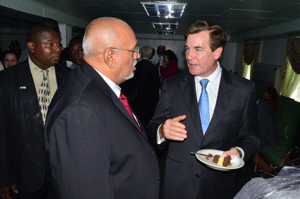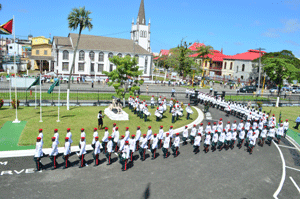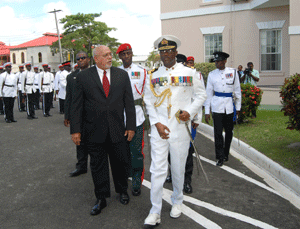–“Makeup of this new Parliament dictates that (all) seek consensus and compromise,” –President Ramotar
PRESIDENT Donald Ramotar has stressed the importance of members of the National Assembly working together in the best interest of all citizens, in the wake of the new parliamentary dispensation wherein the ruling People’s Progressive Party/Civic (PPP/C) singularly has the most seats but the combined opposition has a majority by one seat.  The Head of State was at the time speaking at the ceremonial opening of the 10th Parliament. He acknowledged that moving forward would require maturity and political cooperation in the interest of the development of Guyana, despite differences among the parliamentarians.
The Head of State was at the time speaking at the ceremonial opening of the 10th Parliament. He acknowledged that moving forward would require maturity and political cooperation in the interest of the development of Guyana, despite differences among the parliamentarians.
“I am convinced that we have the capacity to rise to this challenge. I am satisfied that we are capable of demonstrating to the Guyanese nation that, while political competition and diversity are essential in a democracy, they should not foreclose on the possibilities for compromise and consensus in the way we do business. Indeed, the make-up of this new Parliament dictates that we seek consensus and compromise, and should resist the temptation to believe that any party can ride roughshod over another. Any such attempt may see us missing the historical opportunities that this new composition offers,” he explained.
Any such attempt may see us missing the historical opportunities that this new composition offers,” he explained.
He reiterated that his government will not be held to ransom “by any intractable posture by the opposition”, and assured that, within his administration, there is the political will to ensure that the people of the country are put first.
He expressed disappointment that the parties did not find consensus in the election of the Speaker of the Assembly. Nevertheless, the President said, he remained optimistic that seeking agreements by dialogue is still the best way forward, as it is his belief that working together in Parliament can contribute to building trust, which is vital for our political culture. The President also observed that the current international environment is very complicated and difficult, and needed forging of united and strong positions in order to be able to meet the resulting challenges, since international socio-economic and political developments have impacted local realities.
The President also observed that the current international environment is very complicated and difficult, and needed forging of united and strong positions in order to be able to meet the resulting challenges, since international socio-economic and political developments have impacted local realities.
Policies and programmes
President Ramotar also highlighted the Government’s intended policies, programmes and plans in moving forward, while emphasising the importance of continued prudence and good management of the economy.
“Without a doubt, our economy and country have come a far way from the time that our country was forced to enter an IMF agreement in 1989. Guyana has now grown from a US$317 million economy in 1991 to a US$2.261 billion economy in 2010. The per capita income has moved from US$304 to US$2,533 in 2010. In the same period, loans to the private sector increased from $7 billion to $112 billion, while interest rates tumbled from a height of 35% to now within a range of between five to eleven percent,” he added. 
He reported that Government has succeeded in slashing the country’s external debt from US$2.1 billion to just above US$1 billion today.
External reserves have grown from US$123 million to US$780 million, the highest it has ever been; while inflation has been sharply reduced to single digits for more than a decade.
“Guyana is now poised for a rapid take-off”, the President explained, but for this to be realised, the existing issues that can slow down the country must be tackled.
President Ramotar noted that, in order to reach set goals, the human capital must be available to advance the country.
“It is for this reason that we have been spending heavily on the social sector, mainly health, education, housing and water. It is in these areas that we make the most impact in building our people’s capacity. We have taken investments in the social sector from eight percent of our budget in 1991 to some 30 percent of a much bigger and larger allocation in 2010.”
Also high on the agenda of the administration is the security of the nation in the wake of the global fight to tackle crime, particularly those connected to the narco trade, for this reason, he noted that government has been investing quite a lot of resources in equipping and building human capacity through training, since it is even more important to promote and develop international cooperation to deal with the issue. On this note, the President pledged to work with “traditional partners” — the United Kingdom, Canada and the United States of America — to tackle the issue and to deepen relations with our neighbours.
On this note, the President pledged to work with “traditional partners” — the United Kingdom, Canada and the United States of America — to tackle the issue and to deepen relations with our neighbours.
The Head of State also promised to work along with the indigenous peoples to ensure their advancement and greater inputs into national development. Women, youths and the vulnerable within society would also be worked along with.
Speaker’s Address
Meanwhile, Speaker of the National Assembly, Raphael Trotman, acknowledged that the National Assembly has been presented with a precious opportunity for unprecedented cooperation among government and opposition, and he opined that it should not be squandered.
He urged that all rise to the collective challenge issued by the people, and demonstrate that they can work together to make Guyana a united, free and prosperous state, in keeping with the vision for the National Assembly to be one, wherein each member can strive to promote a participatory and inclusionary democracy.
The Speaker also expressed intention to improve inter-party parliamentary relations.
Committee of Selection
Upon resumption of the sitting of the National Assembly later on Friday, a motion was carried paving the way for the Committee of Selection to comprise nine members. This allowed for the combined opposition to take control of the Committee of Selection — responsible for the composition of all other committees in the Parliament — with five seats to government’s four seats.
 Leader of the National Assembly, Prime Minister Samuel Hinds proposed that the Committee of Selection should have 10 members, in keeping with traditional Parliaments, but the Opposition Chief Whip, Amna Ally, subsequently tabled an amendment to that motion put forward by the Government side of the House in which she proposed that the committee of selection be amended to nine members.
Leader of the National Assembly, Prime Minister Samuel Hinds proposed that the Committee of Selection should have 10 members, in keeping with traditional Parliaments, but the Opposition Chief Whip, Amna Ally, subsequently tabled an amendment to that motion put forward by the Government side of the House in which she proposed that the committee of selection be amended to nine members.
The Government’s representatives on the committee will be Prime Minister Samuel Hinds; Presidential Advisor on Governance, Gail Teixeira; Agriculture Minister Dr Leslie Ramsammy and Indranie Chandarpal.
Sitting on the committee for the opposition are Chief Whip Amna Ally, Joseph Harmon, Volda Lawrence, Dr George Norton of A Partnership for National Unity (APNU), and Khemraj Ramjattan of the Alliance For Change (AFC).
Before the motion was carried, however, Ms. Gail Teixeira pointed to the fact that the composition of the Committee of Selection should ensure that there is a balance of the parties’ strengths in Parliament.
“Mr. Speaker, talk has been made by the speaker before me, Chief Whip Amna Ally, about a minority government; but, in Parliament the issue that we are dealing with is to ensure that all of the committees and the Committee of Selection ensure that there is a balance of the parties’ strengths in Parliament. It does not deal with the strength of the opposition and the strength of the Parliament,” she said, pointing to Standing Order 94/1 that says that every committee must reflect a balance of parties in the National Assembly.
According to Teixeira, the PPP/C secured 32 seats, representing 49.230 per cent; meaning 4.9 persons. As “you can’t have a .9 person, therefore the number is upped to five,” APNU secured 26 out of the 65 seats in the legislature, representing 40 per cent of the votes.
On this note, she said that APNU should get four members, while the AFC with 10.76 per cent of the votes should secure one member on the committee.
“This is the fairest mathematical proportionality representation of the parties in these parties,” she told the House.
Composition a travesty
In response to this, Teixeira said the new composition of the Committee of Selection is a travesty and does not reflect a balance of the political parties in Parliament.
She reminded that there were attempts amongst the three parliamentary parties with the President earlier this week, to address the issue of the composition of the Committee of Selection, at which time the PPP/C proposed to APNU and AFC that, based on proportionality of the individual parties, composition of the committee should reflect the balance of the strengths of the parties in Parliament.
She also noted that there is no provision in the constitution or the standing orders for a combined opposition in relation to the Committee of Selection.
“This is the mother committee that sets up all the other committees of the House, and appoints them. In the last Parliament, we had six seats and they (opposition) had four, based on proportionality of seats. The PPP/C is the largest party in Parliament with 32 seats. We oppose this because it is distorting the proportionality of the party’s strength in Parliament. No matter which way you cut it, 49 percent is not 40 percent of the vote,” she explained.
Despite this new development, Teixeira pledged that the PPP/C would continue to work along with the parties in the interest of the Guyanese people, as they have been doing for the past 19 years; and expressed desire to continue testing the sincerity of the comments made on the opposition side about cooperation and working together.



.jpg)









